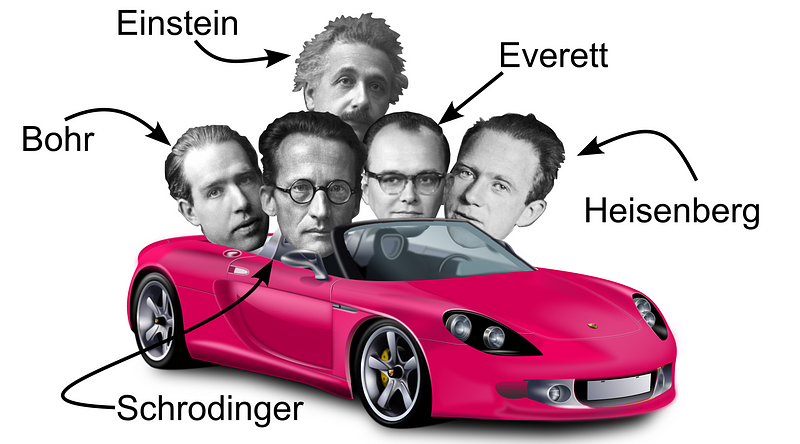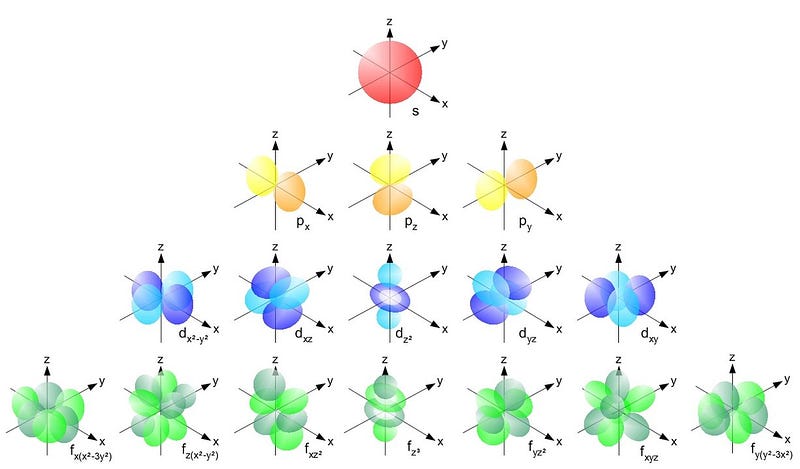A Quantum Physics Joke That Only True Nerds Will Appreciate
Written on

Five quantum physicists are driving together. Heisenberg is behind the wheel, navigating as if he were in The Matrix. In the front seat, Schrödinger is waving at passing cars, while Einstein and Bohr bicker in the back. Everett, seated between them, is lost in thoughts about an alternate universe.
They get pulled over by a police officer. Approaching Heisenberg's window, the officer asks, "Do you know how fast you were going?"
Heisenberg responds, "No, but we know exactly where we are."
The officer, puzzled, states, "You were going 120 km/h!"
Heisenberg raises his arms in exasperation, exclaiming, "Fantastic! Now we’re lost!"
The officer inspects the vehicle and inquires with Schrödinger about the trunk's contents. "A cat," Schrödinger answers.
Opening the trunk, the officer shouts, "This cat is dead!"
To which Schrödinger retorts, "Well, it is now."
Bohr chimes in, "On the bright side, a moment ago, we had no position, speed, or cat. Now we have all three!"
Frustrated, the officer declares, "I just want to know how many of you I need to take back to the station!"
Einstein suggests, "Why not roll dice for it?"
The officer, fed up, shouts, "That's it. I’m taking you all in!"
In a sudden move, Everett jumps into the driver's seat, accelerates, and drives the car off a cliff, proclaiming, "We’ll survive somewhere in the multiverse!"
Still not laughing? Keep reading.
Heisenberg
Heisenberg is famously linked to the uncertainty principle, a key concept in quantum physics that has permeated popular culture. While it might seem unremarkable at first, the principle suggests that certain things are inherently unknowable. This notion might not sound groundbreaking, but it holds a certain power.
The idea that knowledge has limits places humanity back at its core, especially in an age where being central to the universe is a comforting thought. If knowledge is limited, it only comes into play once one decides to seek it. Thus, in a way, we invoke universal laws and shape our understanding of the universe. Take that, eighth-grade teacher who doubted my potential!
In classical physics, everything is predetermined, and measurement precision is merely hampered by noise. However, in quantum physics, certain properties cannot be defined simultaneously. Heisenberg noted that "the more accurately one knows position, the less accurately one knows momentum—and vice versa."
This is why Heisenberg tells the officer he doesn't know his speed; he can't, because he knows precisely where he is. A small uncertainty in position leads to a large uncertainty in speed. When the officer reveals his speed, the balance shifts, and Heisenberg can no longer pinpoint his location. Amusing, isn't it?
Interestingly, the uncertainty in quantum physics extends beyond the position-speed relationship Heisenberg identified, indicating that certain properties may not be definable at all. If we can't define them, do they truly exist? Mind-blowing!
Schrödinger
Schrödinger is perhaps the second most renowned quantum physicist after Einstein, thanks largely to his famous cat. Schrödinger's Cat has infiltrated various forms of media, including poetry, television, and music, becoming a staple for physics enthusiasts.
The cat concept originated in a casual remark Schrödinger made about the ongoing debates in quantum physics. He illustrated a scenario where a cat is trapped in a steel box with a device that might either kill it or leave it alive, depending on whether a radioactive atom decays. Until the box is opened, the cat exists in a state of both life and death, known as superposition.
The humor lies in the fact that Schrödinger keeps a quantum cat in superposition in the trunk. When the officer discovers the dead cat, he collapses the "psi-function." While the premise is dark, it highlights Schrödinger's point about the absurdity of applying quantum principles to macroscopic objects.
In 1935, Schrödinger presented this thought experiment, poking fun at interpretations of quantum indeterminacy that suggested reality is blurred. If electrons are indeed blurry, then so too must be cats—a ludicrous notion!

Despite advancements since Schrödinger's time, the cat paradox remains unresolved. Physicists still debate its implications, and the experiment itself is impossible due to the requirement of perfect isolation. Unfortunately, the cat would likely not survive.
Although explaining a joke typically diminishes its humor, this one remains intact. Heisenberg and Schrödinger's parts are well-known, and while variations exist, I sought a purely quantum-themed joke—one that never fails to amuse!
Bohr
Niels Bohr is a prominent quantum physicist whose work, while significant, often lacks public recognition. He’s known as the “father of quantum physics” and contributed to intriguing philosophical discussions about science. His famous debates with Einstein are legendary.
Most scientists accept that even unobservable phenomena are still real. For instance, electrons can be inferred from their effects, but Bohr argued that they lack independent reality until observed. He suggested that observation itself brings existence to the observed entity, likening our understanding to that of children who haven't yet grasped object permanence.
As Schrödinger's cat illustrates, quantum characteristics extend beyond microscopic realms. Thus, Bohr would argue that until the officer measures it, neither the car's speed nor the cat exist.
Einstein famously challenged this viewpoint, questioning whether the moon exists only when observed. The debate remains unresolved.
Einstein
Albert Einstein is undoubtedly the most recognized physicist, synonymous with genius and characterized by his eccentric appearance. Throughout much of his career, his theories were known only to fellow physicists, yet he became a favorite among journalists for his charisma and memorable quotes.
His most famous remark, "God does not play dice with the universe," often misconstrued as a religious stance, actually reflects his discomfort with quantum mechanics. Despite winning a Nobel Prize for a significant contribution to quantum theory, he sought deterministic laws rather than the randomness presented by quantum physics.
Einstein's quest for a deeper understanding of the universe ultimately proved impossible, as later developments revealed. The insights from quantum entanglement, a phenomenon Einstein found perplexing, are now seen as foundational for new technological advancements—no joke!
Everett
Hugh Everett III introduced ideas so revolutionary in quantum physics that they seem otherworldly—literally. He proposed the many-worlds interpretation, suggesting that every conceivable outcome of quantum events exists in its own universe. This radical perspective diverges from traditional interpretations, making Everett's thoughts read like a sci-fi saga.
Everett's theory was his response to the perplexities of quantum mechanics that baffled great minds like Bohr and Einstein. While others debated the fate of Schrödinger's cat, Everett proposed that it could be alive in one universe and dead in another, offering a way to understand quantum superposition that we never witness.
However, taking this idea to extremes leads to unsettling conclusions. If we repeat Schrödinger’s experiment, there’s always a universe where the cat survives—termed quantum immortality. When Everett seizes the wheel and drives off a cliff in our joke, he illustrates his thesis: somewhere in the multiverse, they land safely and can enjoy the same joke repeatedly.